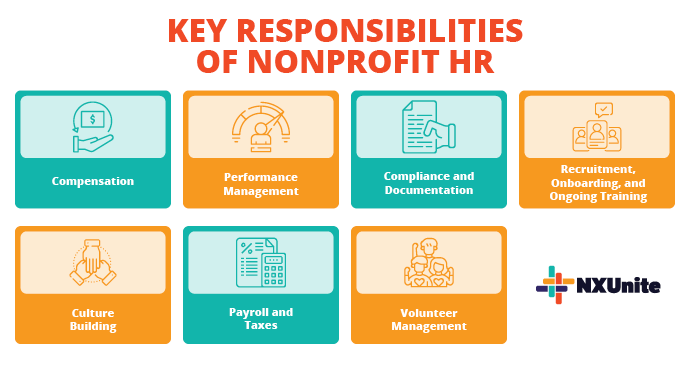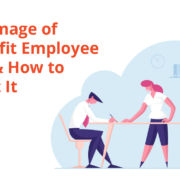Nonprofit HR — Nonprofit Catalog
Your nonprofit relies on people to power its mission, including donors, volunteers, sponsors, and other supporters. But what about the people working behind the scenes—your organization’s staff members?
Your internal team has a unique relationship with your organization. Not only are they passionate about your cause and everything it stands for—they’re also employees of your nonprofit. And as an employer, it’s your responsibility to ensure that their employment experience is a positive one that keeps your internal operations strong so that you can serve your community effectively.
That’s where nonprofit HR comes in! Let’s dive into the basics.
What Is Nonprofit HR?
Nonprofit human resources (HR) is the part of your organization that manages the employer-employee relationship between your nonprofit and its team. This means your HR professional will be responsible for building out a hiring process, managing payroll, carrying out performance reviews, and more.
There’s a misconception that nonprofits are completely exempt from government regulations, and thus don’t need HR. This isn’t true. In fact, any organization with employees needs to comply with employment law. Having a robust HR strategy helps nonprofits adhere to these laws.
Plus, your nonprofit relies on its full-time staff. By optimizing their employment experience, you’ll increase your chances of retaining top talent. And, you’ll set yourself up for growing your team (and thus your organization’s capacity to serve its beneficiaries) down the line.
Nonprofit vs. For-Profit HR
Nonprofits and for-profit organizations both have to adhere to employment laws. And both want to retain their talented employees. But there are some major differences between nonprofit and for-profit HR. Here are some of the unique aspects of nonprofit human resources to be familiar with:
- Mission-Driven Nature: Instead of trying to make a profit, nonprofits are trying to further their causes. Thus, all of the strategies that make up nonprofit HR will be intrinsically tied back to the organization’s larger mission.
- Limited Resources: It’s no secret that nonprofits have to operate on lean budgets and with limited time. This can make it challenging to prioritize HR responsibilities and even put some organizations at risk for violating employment regulations.
- Project-Based Staffing: For nonprofits, some funding sources will be program or project-specific, which translates into staff needs being program and project-specific, too. This can often make nonprofit staffing more complex than it is in for-profit organizations.
- Recruitment: Nonprofits compete with for-profit organizations for talent. And, due to slimmer budgets, they can’t hinge their hiring efforts on salaries. Thus, nonprofits have to take a more holistic approach to compensation in order to stand out in the job marketplace.
Understanding these aspects of nonprofit HR can set your organization up to optimize its HR strategy and better manage your human resources responsibilities.
7 Key Responsibilities of Nonprofit Human Resources
Whether your nonprofit has an in-house team of human resources professionals or you rely on the assistance of an HR consultant, your HR professional will shoulder the following responsibilities:

- Compensation: Because nonprofits face the challenge of trying to be competitive employers while also managing tight budgets, many nonprofits opt for a total rewards approach that involves both direct (salary, bonuses, etc.) and indirect forms of compensation (paid time off, perks). Designing and implementing a total rewards approach that works for your nonprofit is a critical responsibility.
- Performance Management: Performance management, also known as talent management, goes beyond annual performance reviews. It is the process of continually training, coaching, and communicating with employees, and is important for boosting employee performance, engagement, and retention rates.
- Compliance and Documentation: Ensuring that your nonprofit complies with local, state, and federal employment regulations is a big task. Working with an HR consultant, lawyer, or insurance agent can be especially helpful for smaller teams.
- Recruitment, Onboarding, and Ongoing Training: Your HR professional will be responsible for designing what the employee lifecycle looks like at your nonprofit, from recruitment to exit interviews. Though others will be involved in this process (like managers or directors), your HR professional will build out the bulk of your strategy.
- Culture Building: An organization’s internal culture plays a big role in employee engagement and satisfaction. The right HR strategy can set the tone for your nonprofit’s internal culture. For example, your HR professional might help you develop an employee recognition program that shows employees that they’re valued and needed. These programs can involve sending thank-you messages, providing bonuses, hosting awards ceremonies, or providing opportunities for professional development.
- Payroll and Taxes: Alongside your financial professionals, your HR professionals will also be in charge of ensuring payroll is conducted in a timely manner, employees are classified correctly, and the right tax forms (like your Form 990) get to the IRS.
- Volunteer Management: Managing volunteers is an essential part of running a nonprofit, and your HR professionals can help you streamline your management strategy so that you boost your volunteer engagement and retention rates.
Honing your organization’s HR strategy is an essential part of running a successful nonprofit. And remember, though your HR professionals will design and guide your strategy, everyone at your organization has a part to play in making it a great place to work!
Additional Resources
Nonprofit Catalog – Read up on more nonprofit essentials by exploring our Nonprofit Catalog.
Compensation Consulting: The Ultimate Guide (+Top Firms!) – Compensation is a critical aspect of the employee experience. Learn how compensation consulting works, and how to hire a consultant of your own.
HR Consulting Firms: 20+ Top Providers for Small Businesses – Working with an HR consulting firm can give your organization’s HR strategy an edge. Get recommendations for firms to work with!



